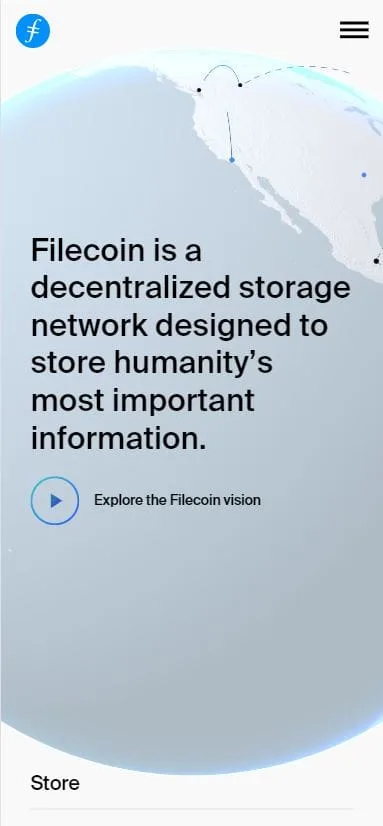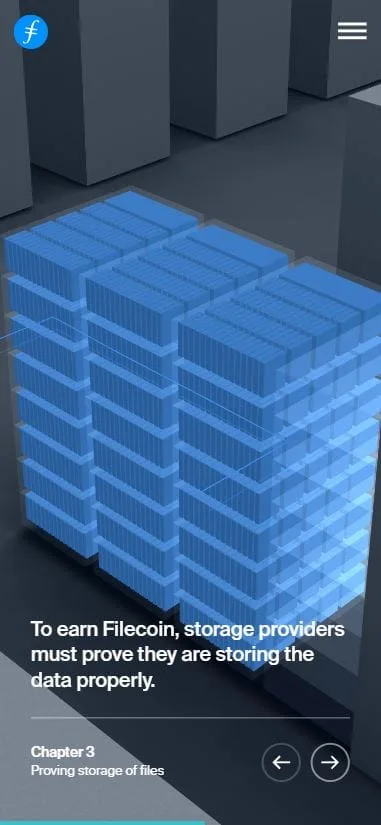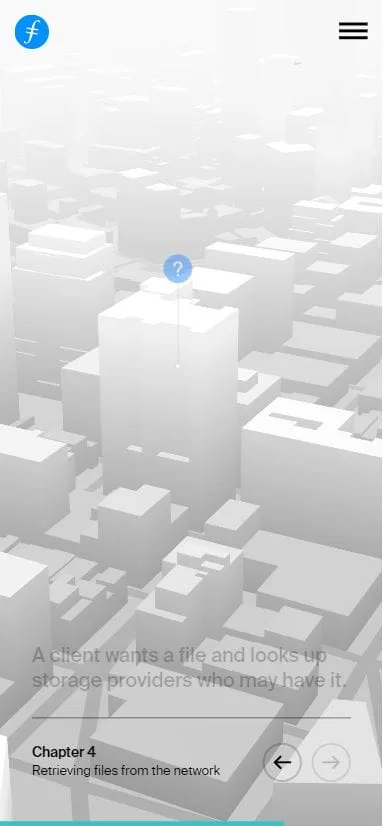What is Filecoin (FIL)?
Filecoin (FIL) is a decentralized storage network designed to provide a secure, efficient, and incentivized way to store and share data using blockchain technology. The network leverages cryptocurrency mining to incentivize a global network of miners to offer data storage space and facilitate data retrieval services. Filecoin’s key innovation is the ability to create an open, competitive marketplace for storage, enabling users to pay miners for storing their data, while miners earn Filecoin tokens (FIL) as rewards for providing storage and ensuring data integrity.
The Filecoin network operates on top of another decentralized protocol called IPFS (Interplanetary File System), which handles the actual file-sharing functionality. While IPFS allows users to freely share files across a decentralized network, Filecoin adds a financial layer, where miners are incentivized to store data for a fee.
Unlike traditional cloud storage solutions like Amazon Web Services (AWS), Filecoin aims to be a censorship-resistant and decentralized alternative, making data storage more private, secure, and affordable.
Key Features of Filecoin (FIL)
- Decentralized Storage Market:
Filecoin allows users to rent out storage space or purchase data storage services from miners. This decentralized model removes intermediaries and ensures that no single entity controls the storage or retrieval of data. - Incentivized File Storage:
Miners on the Filecoin network provide storage space to users in exchange for FIL tokens. The more storage a miner provides, the greater their chance of earning rewards. - Two Types of Mining:
- Storage Miners: These miners provide disk space to the network and earn FIL tokens by storing user data securely.
- Retrieval Miners: These miners help retrieve data and can offer faster data transmission services. They are rewarded for improving data accessibility.
- Proof-of-Replication & Proof-of-Spacetime:
Filecoin uses unique consensus mechanisms, known as Proof-of-Replication and Proof-of-Spacetime, to ensure that miners are actually storing the data they claim to.- Proof-of-Replication: Verifies that a miner has made unique copies of data.
- Proof-of-Spacetime: Ensures that the miner has stored the data over an agreed period of time.
- Storage Markets:
Filecoin operates a storage market where users can bid on storage space offered by miners. The market is competitive, driving prices down, and ensuring that the most reliable and cost-effective miners are rewarded. - Open-Source and Censorship-Resistant:
Filecoin is an open-source project that is governed by the community. The decentralized nature of the network makes it resistant to censorship and control by any single government or corporation.

How Does Filecoin (FIL) Work?
Filecoin operates as a decentralized storage network, where users and miners interact through the Filecoin blockchain. Here’s an overview of how the system functions:
- Users Store and Retrieve Data:
Users who want to store data on the Filecoin network must first choose a miner who offers the best storage price and reliability. Once a miner is selected, the user uploads their data to the miner’s storage, and the miner is paid with FIL tokens. The data is stored on the miner’s disk space, and the user can retrieve it anytime they need it. - Miners Provide Storage:
Miners provide storage space and are rewarded in FIL tokens for the data they store. Miners compete with one another to offer the best prices, making Filecoin an open market for storage. The larger the amount of storage a miner provides, the higher their chance of earning rewards. - Proof Mechanisms:
To ensure that data is being stored correctly and consistently, Filecoin employs two innovative proofs:- Proof-of-Replication: This proof ensures that the miner is truly storing the data they claim to have stored, i.e., that the data is replicated.
- Proof-of-Spacetime: This proof verifies that the data is being stored over a specified period of time.
- Storage Market:
Users and miners interact in the Storage Market. Users place bids to purchase storage, while miners offer storage space at varying prices. The market is driven by the availability and reliability of storage, and the Filecoin network helps ensure that the lowest-cost, most reliable miners are chosen. - Retrieval Services:
Miners can also offer retrieval services, where they help users retrieve data faster or more efficiently. Retrieval miners are rewarded based on the speed and reliability with which they deliver the data.
Proof-of-Replication and Proof-of-Spacetime
Filecoin uses two key proofs to ensure data integrity and trust:
- Proof-of-Replication:
Proof-of-Replication ensures that a miner is storing the data it claims to store. It guarantees that the miner has stored a unique copy of the data and is not just claiming to have it. - Proof-of-Spacetime:
Proof-of-Spacetime is used to verify that the miner has stored the data over a defined period of time. This helps prevent miners from “cheating” by storing data temporarily and then deleting it after a short period.
Both proofs are essential for securing the Filecoin network, ensuring that miners follow the rules and provide reliable storage to users.
Filecoin Mining
Filecoin mining is central to the operation of the network. It involves two distinct roles:
- Storage Miners:
Storage miners provide physical disk space to the Filecoin network. They offer storage to users who pay FIL tokens to store data on their machines. The more storage miners offer, the higher their chances of earning FIL tokens through rewards.- How It Works: Miners receive FIL tokens for storing data and performing the necessary proof calculations.
- Miners’ Rewards: Miners are rewarded not just for providing storage, but also for demonstrating that they have kept the data intact over time.
- Retrieval Miners:
Retrieval miners focus on the retrieval and distribution of data. They are responsible for delivering data to users who request it. Retrieval miners may offer faster speeds or specialized services such as caching or participating in a content delivery network (CDN).
The Filecoin Network and Market
Filecoin’s network includes a storage market where users bid on space for storing data, and miners compete to offer the best prices and services. The Filecoin blockchain facilitates this market by tracking all transactions and ensuring miners adhere to storage and retrieval rules.
Filecoin’s market has the potential to be more competitive than centralized cloud storage services (e.g., Amazon Web Services), since miners are incentivized to compete for users, which could reduce prices.
History of Filecoin
- Founding:
Filecoin was created by Protocol Labs, a company founded by Juan Benet. The protocol was designed to address the issues of centralized cloud storage providers by offering a decentralized alternative powered by blockchain technology. - Initial Coin Offering (ICO):
In 2017, Filecoin raised $257 million in one of the largest initial coin offerings (ICOs) at the time. The funds helped accelerate the development of the Filecoin network, which was initially expected to launch in 2019. - Launch:
After several delays, Filecoin launched its mainnet in October 2020 after undergoing extensive testing. The network’s formal launch marked the beginning of its full integration with the IPFS network. - Rivalry with Other Projects:
Filecoin faces competition from other decentralized storage networks like Storj and Siacoin. Storj claims to have a network capacity of over 100 petabytes, while Siacoin has about 2 petabytes as of 2020. However, Filecoin remains one of the most high-profile projects in this space, partly due to its large ICO and its integration with IPFS.
























Harran –
Good